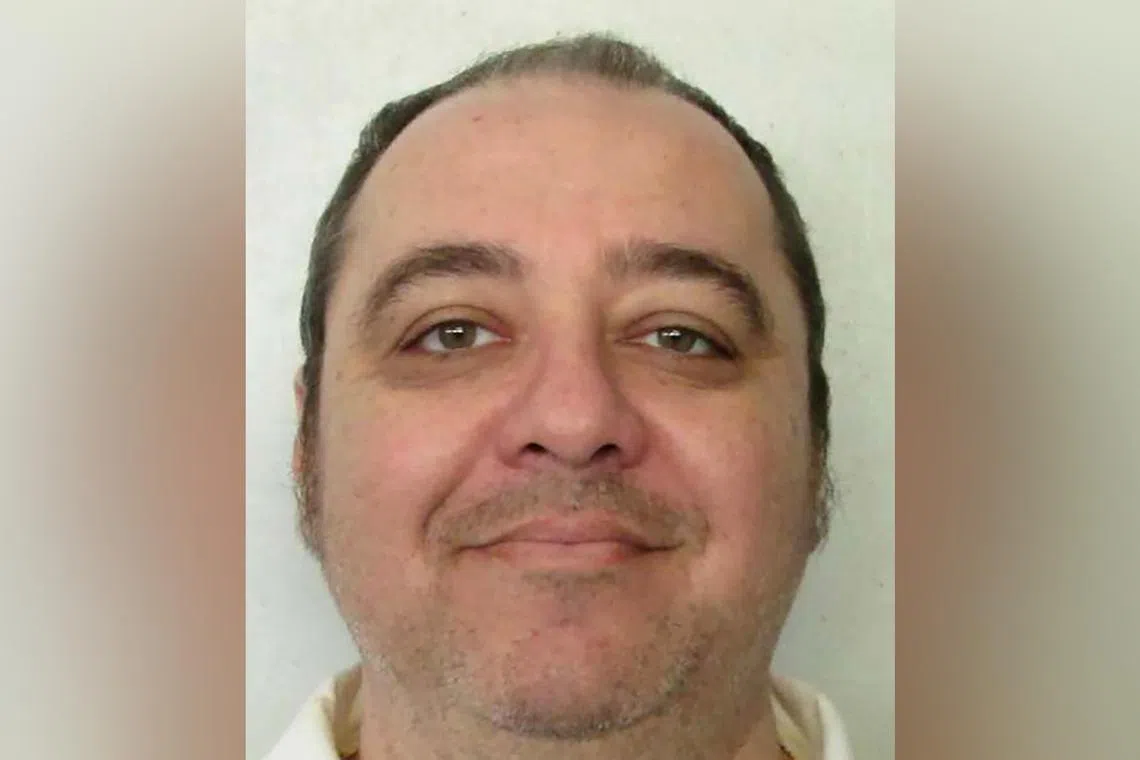Convicted murderer in US executed using nitrogen gas after failed lethal injection in 2022
Sign up now: Get ST's newsletters delivered to your inbox

Kenneth Smith, who was convicted of a murder-for-hire, had survived Alabama's previous botched attempt to execute him by lethal injection.
PHOTO: REUTERS
ALABAMA - Alabama on Jan 25 executed convicted murderer Kenneth Smith, who held his breath in vain as officials asphyxiated him with nitrogen gas, the first use of a new method of capital punishment since lethal injections began in the US four decades ago.
Smith, convicted of a 1988 murder-for-hire, was a rare prisoner who had already survived one execution attempt. In November 2022, Alabama officials aborted his execution by lethal injection after struggling for hours to insert an intravenous line’s needle in his body.
The state has called its new protocol “the most painless and humane method of execution known to man”. It predicted Smith would lose consciousness in under a minute and die soon after, although witnesses on Jan 25 said it appeared to take several minutes longer.
Alabama has touted asphyxiation as a simpler alternative for prison systems that struggle to find either veins or the required drugs for lethal injections.
Human rights groups, United Nations torture experts and lawyers for Smith had sought to prevent it, saying the method was risky, experimental and could lead to an agonising death or non-fatal injury.
The UN’s human rights chief condemned the execution, saying the method could amount to torture.
“I deeply regret the execution of Kenneth Eugene Smith in Alabama despite serious concerns this novel and untested method of suffocation by nitrogen gas may amount to torture, or cruel, inhuman or degrading treatment,” Mr Volker Turk, the UN High Commissioner for Human Rights, said.
In Smith’s second and final trip to the execution chamber on Jan 25, executioners restrained him in a gurney and strapped a commercial industrial-safety respirator mask to his face. A canister of pure nitrogen was attached to the mask that, once flowing, deprived him of oxygen.
The execution began at 7.53pm and Smith was declared dead at 8.25pm, prison officials said.
Smith appeared to remain conscious for several minutes after the nitrogen was activated, according to five journalists who were allowed to watch the execution through glass as media witnesses.
Although the mask was also secured to the gurney, he began shaking his head and writhing for about two minutes, and then could be seen breathing deeply for several minutes before his breathing slowed and became imperceptible, the witnesses said.
“It appeared that Smith was holding his breath as long as he could,” Alabama Corrections Commissioner John Hamm told a press conference. “He struggled against the restraints a little bit, but it’s an involuntary movement and some agonal breathing. So that was all expected.”
Reverend Jeff Hood, Smith’s spiritual adviser, was at Smith’s side for the execution, and said prison officials in the room “were visibly surprised at how bad this thing went”.
“What we saw was minutes of someone struggling for their life,” Rev Hood, attending his fifth execution in the last 15 months, told reporters. “We saw minutes of someone heaving back and forth. We saw spit. We saw all sorts of stuff from his mouth develop on the mask. We saw this mask tied to the gurney, and him ripping his head forward over and over and over again.”
Before the nitrogen was switched on, Smith made a lengthy final statement that began: “Tonight, Alabama caused humanity to take a step backward.”
His wife and other relatives attended and he gestured towards them. “I’m leaving with love, peace and light,” he said, according to media witnesses. “Love all of you.”
Failed challenges
Smith mounted legal challenges in federal courts arguing that Alabama’s method amounted to unconstitutional “cruel and unusual punishment”, but he failed to cross the high bar needed to have a judge order a delay of his execution.
His lawyers raised fears the mask would not properly seal against Smith’s face, allowing oxygen to seep in, delaying or even averting the moment of unconsciousness and risking serious brain injury.
Though poisonous gases such as hydrogen cyanide have been used in executions in the US and beyond in the past, this was the first time a death sentence was carried out anywhere using an inert gas to suffocate someone, capital punishment experts say.
Oklahoma and Mississippi have also approved nitrogen asphyxiation methods for executions, but have yet to deploy it.
Smith, who has suffered from nausea since he survived his first execution attempt, also raised concerns he would vomit into the mask and choke. In response, prison officials said they would serve him his final meal on the morning of Jan 25 and forbid any solid foods after 10am. His final meal was steak, hash browns and eggs.
The US Supreme Court’s conservative majority rejected Smith’s final appeal to delay his death on the evening of Jan 25, and the execution began soon after.
Alabama Governor Kay Ivey, a Republican, said in a statement: “On March 18, 1988, 45-year-old Elizabeth Sennett’s life was brutally taken from her by Kenneth Eugene Smith. After more than 30 years and attempt after attempt to game the system, Mr Smith has answered for his horrendous crimes.”
Smith was convicted of murdering Mrs Sennett, a preacher’s wife, after he and accomplices each accepted a US$1,000 fee from her husband to kill her, according to trial testimony.
Eleven of 12 jurors voted to sentence Smith to life in prison, but an Alabama judge overruled their recommendation under a law that has since been abolished as unconstitutional.
Several of Mrs Sennett’s relatives attended the execution and told reporters they had forgiven her killers.
“Nothing that happened here today is going to bring mum back,” said the victim’s son, Mr Mike Sennett. “It’s a bittersweet day; we’re not going to be jumping around, hooping and hollering, hooraying and all that, that’s not us. We’re glad this day is over.” REUTERS


